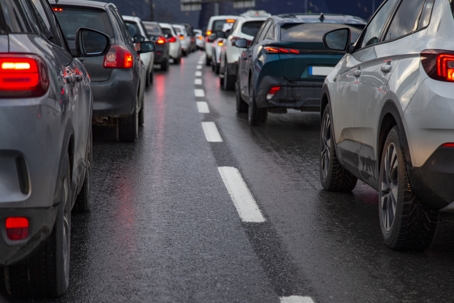Memorial Day weekend is a time for reflection and celebration, but it's also one of the busiest travel times of the year. With congested roads and heightened accident risks, preparation is key to ensuring safe and stress-free travels. This guide provides practical tips and strategies for navigating holiday traffic while reducing your chances of being involved in an accident.
Understanding Memorial Day Traffic Patterns
Historical Traffic Trends
Memorial Day weekend consistently sees a dramatic increase in road traffic, with volumes rising as much as 60% compared to typical weekends. Congestion peaks Friday afternoon as travelers head out and again Monday evening as they return home. Major highways to vacation destinations experience the worst delays, often leading to long travel times. By understanding these patterns and planning around them, travelers can reduce stress and improve their driving experience during the holiday.
Factors Contributing to Increased Traffic
The holiday encourages people to travel for family visits, events, or vacations, intensifying road congestion. Local parades and festivals further exacerbate traffic flow near event areas. Good weather increases traffic as more people plan outdoor activities, while bad weather can worsen driving conditions and slow traffic. Recognizing these contributing factors allows drivers to plan smarter and safer routes for their journeys.
Common Accident Causes During Memorial Day Weekend
Frequent Driving Behaviors Leading to Accidents
Problematic behaviors like speeding and distracted driving escalate during Memorial Day travels. Many drivers rush to their destinations, which leads to reckless driving in heavy traffic. Similarly, distractions such as texting or using navigation devices without stopping create hazards. Staying aware of these common risks and maintaining focus on the road helps prevent collisions and ensures safer travel for everyone.
The Role of Alcohol Consumption and Fatigue
Holiday celebrations often involve alcohol, leading to a rise in impaired driving incidents. Designating a sober driver or arranging alternate transportation is essential. Fatigue also contributes to accidents, as longer trips can cause diminished alertness behind the wheel. Taking regular breaks and ensuring adequate rest can help drivers stay focused and responsive, making roads safer for all during this busy time.
Planning Your Trip to Minimize Traffic Risks
Choosing the Best Travel Times
Avoiding peak travel hours—like Friday afternoon and Monday evening—can significantly reduce time spent in traffic. Early-morning or late-night drives often provide calmer road conditions. Traffic apps give real-time updates on delays, construction, and incidents, helping travelers select the most efficient routes. Strategically planning your departure and return times can make the difference between smooth and frustrating trips.
Selecting Safer Routes
Alternate routes like backroads or secondary highways can help bypass heavily congested main roads. Researching routes in advance and staying updated on closures or construction zones are also crucial. Scenic routes not only enhance the drive’s experience but may also reduce encounters with reckless drivers. Knowledgeable planning ensures that trips are both safer and more enjoyable.
Safe Driving Practices for Holiday Travel
Defensive Driving Techniques
Defensive driving strategies effectively reduce accident risks, like maintaining safe distances and anticipating other drivers’ actions. Staying calm when encountering aggressive drivers and giving them space helps de-escalate tensions on the road. Being alert and prepared for sudden traffic shifts enables better reaction times and minimizes potential hazards. These proactive techniques are indispensable during high-volume traffic weekends.
Avoiding Distractions
Minimizing distractions, such as setting up navigation and playlists before starting your trip, is essential for road safety. Drivers should use hands-free technology when communicating and ensure children and pets are entertained to avoid chaos in the vehicle. Focused attention on driving significantly reduces the likelihood of accidents, making the road safer for everyone.
Dealing with Emergencies on the Road
Responding to Accidents and Breakdowns
Handling an accident or a vehicle breakdown starts with prioritizing personal and passenger safety. Key steps include moving to a safe spot, notifying emergency services promptly, and alerting other drivers with hazard lights. For breakdowns, having emergency gear like reflective triangles and a roadside assistance plan ensures quicker resolution. Being prepared for emergencies with appropriate protocols helps reduce stress and enhance safety.
First Aid and Safety Precautions
Stocking a basic first aid kit with essentials like bandages and pain relievers is an invaluable preparation step. Familiarity with addressing minor injuries or knowing when to call for medical assistance ensures readiness for unexpected situations. Safety-conscious travel, complete with emergency supplies, equips drivers and passengers to deal confidently with unforeseen issues.
Leveraging Technology for Safer Travel
Utilizing GPS and Traffic Apps
GPS and real-time traffic apps optimize routes and alerts for congestion, accidents, or road closures. Tools like Google Maps or Waze also identify nearby amenities such as gas stations and rest areas. Leveraging such technology ensures smoother travel by saving time and avoiding potential hazards.
In-Car Safety Features
Modern vehicles offer built-in safety tools like lane departure warnings and adaptive cruise control, which enhance awareness and accident prevention. Using these features optimally can make navigating dense holiday traffic far less stressful. Understanding and employing these technologies provides drivers with an added level of confidence and safety.
Columbia Car Accident Lawyers
Memorial Day travel should be enjoyable, not stressful. By planning your trip, practicing safe driving methods, and using available tools, you can minimize risks and focus on making memories. If you experience a car accident or face legal challenges, the experienced attorneys at Smith Born Leventis Taylor & Vega, LLC in Columbia, SC, are ready to assist. Our team specializes in traffic accident cases and offers compassionate, dedicated legal support. Contact us today at (803) 599-2207 to learn how we can help you so you can focus on confidently moving forward. Safe travels!

